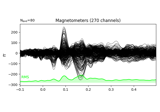mne.concatenate_epochs#
- mne.concatenate_epochs(epochs_list, add_offset=True, *, on_mismatch='raise', verbose=None)[source]#
Concatenate a list of
Epochsinto oneEpochsobject.Note
Unlike
concatenate_raws, this function does not modify any of the input data.- Parameters
- epochs_list
list List of
Epochsinstances to concatenate (in that order).- add_offsetbool
If True, a fixed offset is added to the event times from different Epochs sets, such that they are easy to distinguish after the concatenation. If False, the event times are unaltered during the concatenation.
- on_mismatch‘raise’ | ‘warn’ | ‘ignore’
Can be
'raise'(default) to raise an error,'warn'to emit a warning, or'ignore'to ignore when the device-to-head transformation differs between instances.New in version 0.24.
- verbosebool |
str|int|None Control verbosity of the logging output. If
None, use the default verbosity level. See the logging documentation andmne.verbose()for details. Should only be passed as a keyword argument.New in version 0.24.
- epochs_list
- Returns
- epochsinstance of
Epochs The result of the concatenation.
- epochsinstance of
Notes
New in version 0.9.0.
Examples using mne.concatenate_epochs#

Working with CTF data: the Brainstorm auditory dataset